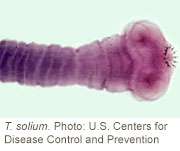Tapeworm-linked seizures may be rising in US, doctors say

(HealthDay)—Tapeworm infection in the brain that can trigger seizures is a growing health concern, doctors say.
But the infection, which leads to swelling in the brain, is usually treatable with medication, according to a leading association of neurologists.
Estimated cases of neurocysticercosis, as the tapeworm infection is called, range from 40,000 to 160,000 each year in the United States, said Dr. Peter Hotez, dean of the National School of Tropical Medicine at Baylor College of Medicine in Houston. "It's been around a long time, affecting people living in severe poverty, but the disease is not well-studied or understood," Hotez said.
Texas is one area of the country with many cases. "The disease has now become a leading cause of epilepsy in Houston," Hotez said. "Every [week], we have patients come into our tropical medicine clinic with it."
Concerns about an apparent increase of neurocysticercosis within the United States led the American Academy of Neurology to issue treatment guidelines for doctors and patients in the April 9 issue of the journal Neurology.
The recommendations are based on a review of 10 studies published between 1980 and 2010 that evaluated so-called cysticidal drugs for treatment of tapeworm infections. The infection involves infestation of the brain with the larvae of the Taenia solium tapeworm. In severe cases, it can cause death.
Tapeworm infection is common in Third World countries because of inadequate sanitation and hygiene, and an estimated 2 million people worldwide have epilepsy as a result. The good news is that good hygiene and food preparation can prevent it.
People develop the tapeworm infection when they consume improperly cooked meat, such as pork, or any food or drink that contains the tapeworm eggs or larvae (also known as cysts). Touching the fecal matter of an infected person is another means of transmission. The larvae then transform into full-sized tapeworms, which can grow to several feet, Hotez said.
In pigs, tapeworm larvae travel to the brain and await transmission to another animal (a human, for instance) when the pigs are eaten, he said. The parasites do the same thing in humans, but there's nowhere to go from the human brain. Ultimately, the larvae die, and that's when the trouble begins.
As the larvae die, they lose the ability to hide from the body's immune system. The immune system responds by causing inflammation, which leads to epileptic seizures and brain swelling, Hotez said.
The guidelines for children and adults recommend using the medication albendazole to kill the cysts if they're alive and treating brain swelling with corticosteroid drugs that dampen the immune system. The study found that albendazole (Albenza), used with or without the corticosteroids, reduced seizure frequency and the number of brain lesions seen in imaging scans. Not enough data was available to evaluate another drug, praziquantel, the researchers said.
Only limited evidence exists to support specific treatment approaches, however, and the treatments may produce side effects, such as abdominal complaints, according to the guidelines. It's also unclear whether anti-epileptic medications may help prevent the seizures caused by the inflammation.
For now, the key is physician awareness, said Dr. Karen Roos, a professor of neurology at the Indiana University School of Medicine and lead author of the guidelines. "Physicians from areas of the world where this infection is endemic are very knowledgeable about this infection," she said. "They know more than U.S. physicians."
Infection with the tapeworm is preventable through proper sanitation, good hygiene and thorough cooking of meat.
More information: For more about tapeworm infection, try the U.S. National Library of Medicine.
Health News
Copyright © 2013















